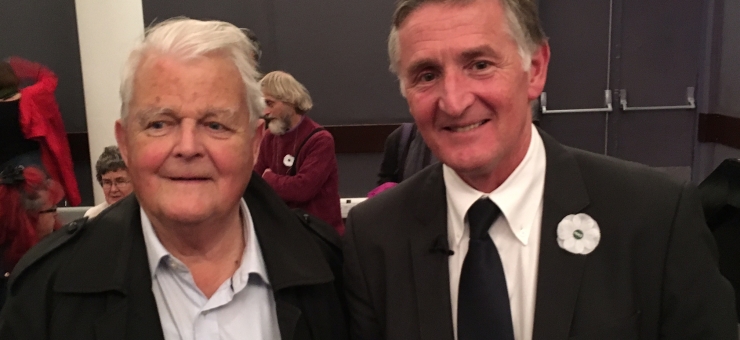News
In his Remembrance Day Lecture, UNI GS says peace central to the union mission

UNI GS, Philip Jennings with peace activist and prominent member of the Movement for the Abolition of War (MAW), Bruce Kent - Jennings invited to speak by MAW.
UNI Global Union General Secretary Philip Jennings told a packed hall at the Imperial War Museum in London that unions and the peace movement must work together to put peace at the top of the global agenda.
During his Remembrance Day Lecture at the invitation of MAW , Jennings evoked memories of the day war was ‘outlawed’, with the signing of the Kellogg-Briand Pact: August 27 1928.
Jennings said, “The US, UK, France and Germany were among the countries who signed up to the Pact and agreed not to settle conflict through war. It’s easy to denigrate the Pact but it was a landmark agreement which showed that another world was possible with enough political will. This is not naivety, a leading U.S. academic has proved that non-violence works. We the unions must ensure that peace is at the top of the global agenda because the work we are doing by fighting for equality and workers’ rights in a world where eight men own the wealth of half the population, is rooted in democracy, human rights and peace.”
In a wide-ranging speech that put the union movement’s contribution to peace into context, the UNI GS pointed out that the unions across Europe had stood up for peace before World War One and ensured that the creation of the ILO was part of the Versailles Peace Treaty after the ‘war to end all wars’, claimed 40 million lives of the 187 million lives lost in the 20th century to conflict.
Jennings said, “Unions have always been a mainstay of peace and an obstacle for those who prefer tyranny. Hitler’s first act on taking power in 1933 was to outlaw the unions because he knew they stood in his way. After the Second World War unions built through the steel and coal community what was to become the European Union. The EU is a peace project, a message drowned out at the EU referendum that brought Brexit in the UK.
“Be warned, there is a resurgence of xenophobia and racism feeding extremism. The danger signs are everywhere as ultra-right wing parties are on the rise across Europe, including in Germany, where 90 members of a right wing group were recently elected to the German Parliament. There is a resurgence of extremism elsewhere too notably in Austria, France, and Holland. Not forgetting here in the UK where last year Labour MP Jo Cox was murdered by an extremist. And just a few days ago in Poland, 60,000 people marked Independence Day by marching under a banner, carrying a message of blatant racism and hate.
“Overshadowing all of this is the threat of nuclear annihilation, at a time when the Doomsday Clock stands at three minutes to midnight. The Korean peninsula is at boiling point and President Trump is stoking the flames.”
However despite the size of the task facing us, Jennings said that another world was possible and gave examples of the positive influence of the union movement on peace in many parts of world including Tunisia and Colombia.
He also said that UNI has always been a proud advocate of peace, “UNI took 2000 affiliates to Nagasaki for our world congress in 2010, they heard testimony from the Hibakusha of the horrors of the most deadly form of warfare to date. Unions and the peace movement must come together to prevent such a catastrophe happening again, through advocating peace in all our work in every continent, especially with new threats from Artificial Intelligence, such as killer robots and drones.
“Is it possible to succeed? The fact that the International Campaign to Abolish Nuclear Weapons (ICAN) is to receive the Nobel Peace Prize next month after helping to secure the UN Treaty to Prohibit Nuclear Weapons is an indicator of a renewed appetite for peace. Peace is enshrined in the UN SDGS and it is also part of the UN Declaration of Human Rights which celebrates its seventieth anniversary next year. Peace is the heart of the union movement because it is not merely the absence of war but the right to live free from fear.”
Jennings concluded his lecture by quoting Martin Luther King, “There comes a time when silence is betrayal. The union movement alongside the peace movement will not remain silent.”
The UNI GS will be among a group of union leaders who will take this message of peace to the Vatican later this month, where they will meet with Pope Francis.

